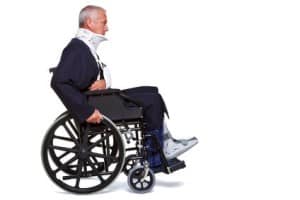Shoulder injuries are one of the most common types of injuries that occur in the workplace. However, these injuries can be some of the most frustrating and difficult.
I never realized how I used my shoulder until I injured it. I had a somewhat minor injury to my shoulder a number of years ago. It seemed to affect everything I tried to do from brushing my hair to opening a door.
Whether you suffer a minor or more serious shoulder injury, it can make it difficult to do your job. If an activity or task you were doing at work causes your shoulder injury, should you receive workers compensation for it?
 Does workers compensation cover my shoulder injury?
Does workers compensation cover my shoulder injury?
Georgia’s workers compensation law generally covers work-related injuries. For the most part, that means injuries that you suffer at work should be covered by workers compensation.
The most obviously example of that is when you suffer a specific traumatic event at work. Some common examples of this include:
- You lift a heavy object and injure your shoulder
- You reach overhead to grab something and your shoulder pops
- You fall and land on your shoulder suffering an injury
- Your shoulder gets jerked and you suffer an injury
These types of traumatic shoulder injuries while doing your job should be covered under workers compensation.
What if I had medical treatment for my shoulder before this injury occurred?
Having past medical treatment for a shoulder injury does not prevent you from receiving workers compensation benefits if you suffer a later on the job injury. There are two different ways that this can come up:
- You suffer from a preexisting condition in your shoulder. Then, you suffer a later work-related injury that aggravates that preexisting condition.
- You suffer one type of injury to your shoulder in the past and get medical treatment for it. You later suffer a work-related injury to a different part of your shoulder that is unrelated to the first injury
In example #2, the injury that you suffer is a completely separate injury from you original injury. While it is to the same general part of your body, it is a different part of that general part of your body and probably has nothing to do with the original injury. These types of injuries should be covered under workers compensation.
Example #1 focuses on a situation where you reinjure the same part of your shoulder that you had injured before. Even though the injury is to the exact same part of your shoulder, it still may be covered under Georgia’s workers compensation law. This is because Georgia’s law covers aggravations of preexisting conditions.
There are special rules about aggravations of preexisting conditions that are a little different from regular injuries. This article I wrote discusses the details of those special rules.
Am I covered if my shoulder problems developed gradually over time instead of from one specific event?
Yes. Georgia’s workers compensation law covers injuries regardless of whether they develop from a specific traumatic event or gradually from repetitive trauma.
The list of types of injuries that I gave earlier focused on single traumatic events. However, many people suffer injuries that develop as a result of several smaller accidents at work or as a result of doing the same repetitive or heavy tasks over and over again.
Some of the common types of work that I have seen lead to shoulder injuries include:
- Lifting and carrying heavy objects
- Overhead lifting or reaching
- Repetitive use of your arms
It is not uncommon for insurance companies to try to deny these types of claims on the grounds that there was not a work-related accident. But, the law in Georgia considers accidents to be more than just a one time, traumatic event.
 Does Georgia workers compensation pay me while my shoulder injury keeps me out of work?
Does Georgia workers compensation pay me while my shoulder injury keeps me out of work?
Yes. Payment for your wage loss is one of the primary benefits that Georgia workers compensation provides.
If your work-related injury keeps you from working, you should start receiving wage loss benefits from the workers compensation insurance company. These benefits you receive are known as temporary total disability benefits. They are paid on a weekly basis.
If your injury allows you to perform light duty work, you may still be making less money. If you are working but losing money as a result of your injury, you should receive temporary partial disability benefits.
Will workers compensation pay my medical bills for my shoulder treatment?
Medical treatment and testing for your injury is one of the other primary benefits that Georgia workers compensation provides. The medical treatment and testing you need for your injury is covered one hundred percent with certain authorized doctors. This means that you do not have to pay a copay or a deductible.
It is important that you understand how medical treatment works under Georgia’s workers compensation. If you do not understand, you could fall into one of the following pitfalls:
- Not being able to see the best doctor to treat your injury
- Being responsible for payment of some of your medical bills because you treat with an unauthorized medical provider
- Having your medical treatment delayed or denied because you do not understand how to get medical treatment approved
 Does workers compensation cover my shoulder injury?
Does workers compensation cover my shoulder injury? Does Georgia workers compensation pay me while my shoulder injury keeps me out of work?
Does Georgia workers compensation pay me while my shoulder injury keeps me out of work?







